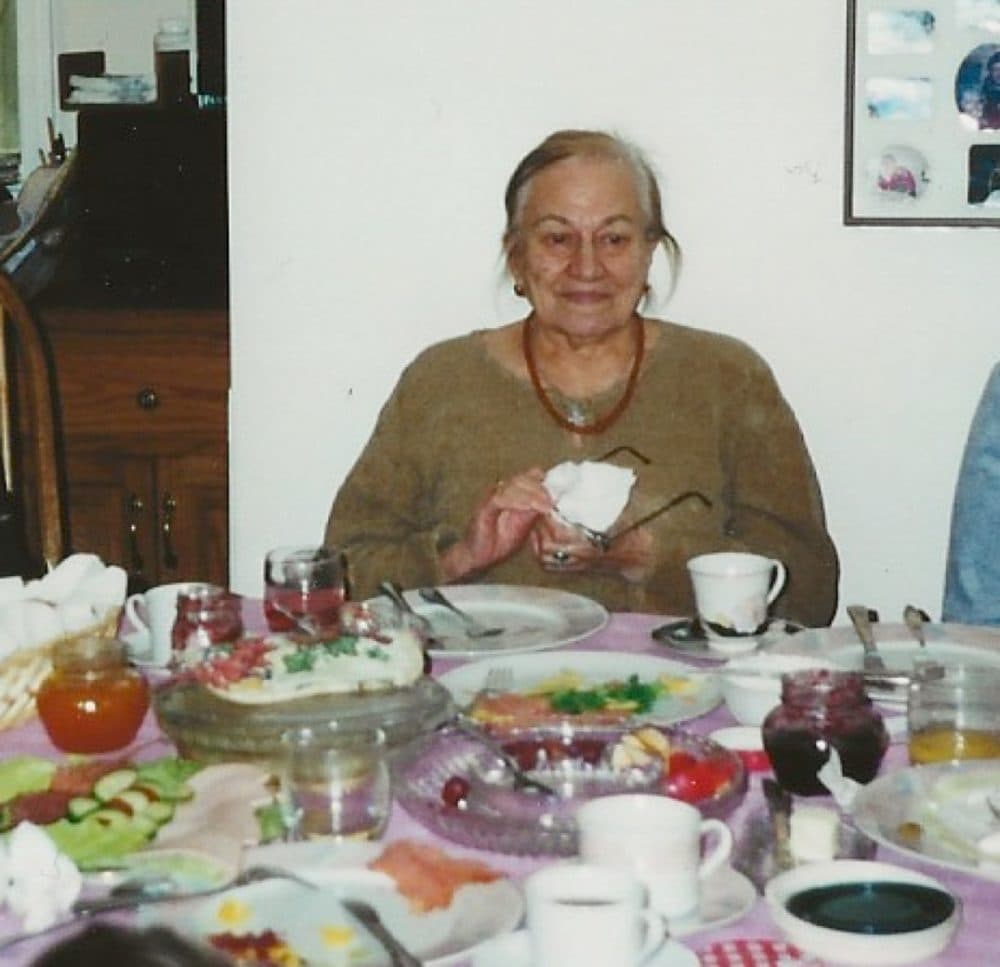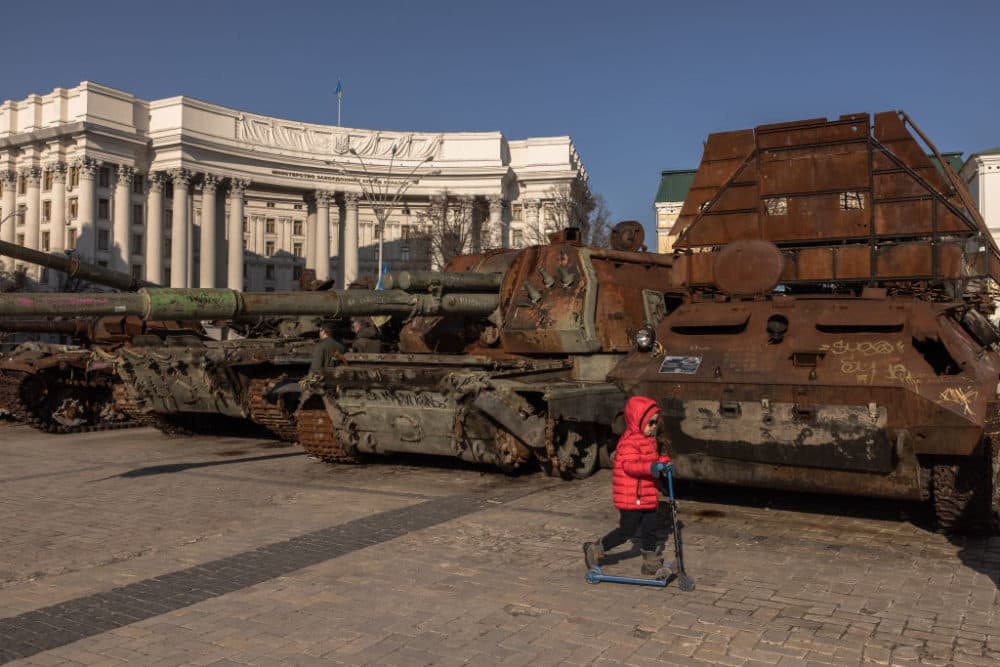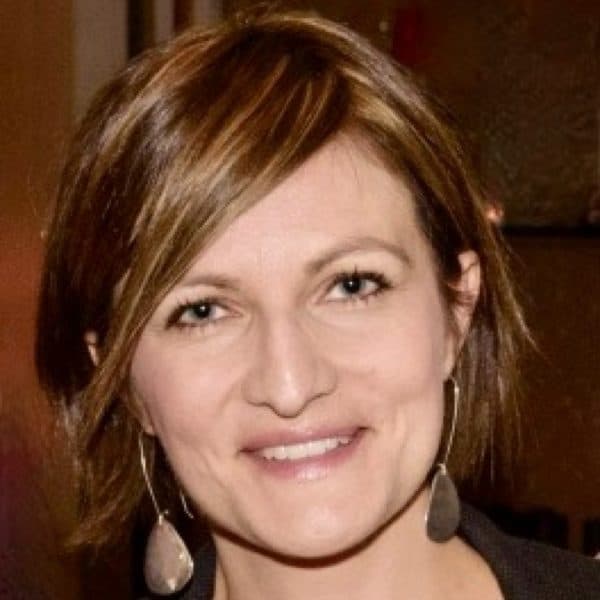Advertisement
Commentary
I’m a Russian in the diaspora. None of us can be complacent

At the end of December, I got a text from a Ukrainian friend, a young mother who fled her home with her daughters three days after the Russian invasion — and is now building a new life in Boston. She shared her plan to prepare the traditional dishes to ring in 2023, and it got me longing for the carefully chopped salads that define New Year’s celebrations in Russia and Ukraine.
Shared culinary tradition is one of the many things that bind the people of Eastern Europe. I’m not the chef my friend is, but why not buy the food I love and uphold the things we share as political madmen do what they can to divide us?
I can remember my great-grandmother — born on a Ukrainian estate that was confiscated by the Bolsheviks -- spending hours dicing potatoes, beets, carrots and onions as midnight neared in our Moscow kitchen. Eating the food would be, as much as anything, a tribute to her. I longed, especially, for her beet-based vinegret salad.
With this plan in mind, I headed to my local Russian grocery store for the first time since Russia invaded Ukraine. It hadn’t been a conscious protest. Food — and the immigrants who make it — didn’t start the war. They didn’t force millions of Ukrainians from their homes; they didn’t kill tens of thousands of souls. And yet, I harbored a perhaps irrational aversion to symbols reminding me that my birth country has been destroying the country of my ancestors for a year.
I stood in a long queue surrounded by elderly, Russian-speaking shoppers whose grumbling and 1980s berets brought me back to my years in Soviet Russia. When it was my turn at last, I asked the no-nonsense lady behind the counter for two large containers of vinegret and, on a whim – because I’d skipped breakfast – a couple of golubtsi, too. Golubtsi were another of my great-grandmother’s favorite things to make. Though the word sounds a lot like the Russian word for “pigeon,” the main ingredient is in fact ground beef, mixed with rice and wrapped in cabbage leaves.

I raced home to relish my acquisitions.
Hunger can make one oblivious. But by the second golubets (singular), I knew something was off. I spit it out, turned up the lights and called my husband over. Where there should have been ground beef, there was chicken, and it was completely raw.
“Don’t you think you were supposed to cook it?” my husband gaped.
I dialed the Russian store.
“Excuse me, what’s in your golubtsi?” I asked.
“Chicken and rice,” the woman answered.
“Was I supposed to cook them?” I asked.
“No, of course not! Our golubtsi are fully prepared.” She sounded offended.
I told her they were fully raw, and I’d just eaten one. She walked to the case, cut one open, and, entirely unstirred, said, “Hmm, yeah, totally raw.”
Having lived for too long in America, I waited for her to apologize or to offer a refund or a bottle of vodka. But they were busy. Could I call back?
Advertisement
The next day, I carried the remaining golubets and the beet salad (which had already started to decompose) back to the grocery store.
The cashier, a young man this time, wasn’t nearly as remorseful as I hoped he’d be.
“Our chef, you know, he’s gotten kind of lazy,” he informed me.
“Too lazy to cook chicken?” I asked.
“Yeah, yeah.”
He promised to talk to the chef, handed me a refund, and shouted, “Next!”

I was lucky: I didn’t get sick. But my discomfort about the whole incident was reflective of a different kind of ailment. As a Russian-born person turbulently infuriated with my birth country, the raw chicken exacerbated my already profound sense of shame for Russia, and my concern for how Russians are now perceived around the globe. To have representatives of our culture behave irresponsibly and not care a whit didn’t sit right at all.
Mistakes happen — in the kitchen and elsewhere. It may even be that the “lazy chef” isn’t from Russia. But it’s known as the Russian food store. It’s one of the places people considered boycotting last year when Russia invaded Ukraine (because we always need someone to blame).
I can’t let go of the feeling that all of us affiliated with Russia — food shops included — have a responsibility to uphold higher standards, especially now.
After the invasion, actor and dancer Mikhail Baryshnikov, writers Boris Akunin and Oleg Radzinsky, and economist Sergei Guriev founded an anti-war, pro-democracy humanitarian organization, True Russia, in part to counteract Russia’s plummeting image. “The very word ‘Russian’ has become toxic,” they acknowledged. “Most of us are far away from the conflict, and from Russia. We may be powerless to stop this nightmare, but we do not have the right to remain idle.”
Of course, they aren’t talking about cooking food to the correct internal temperature. But if we are to continue reminding the world that we don’t support the Kremlin – and that “Russian” doesn’t mean “Putin” – we can’t remain idle in any realm.
While Putin believes that Russia’s fate is to seize control and restore “glory” by force, many ordinary Russians have come to believe — over countless generations of inhumane, undemocratic rule — that they have no control over anything. This fatalism runs deep in the Russian spirit, often marked by a sense of little agency over one’s life.
When I used to visit Moscow, making advance plans was impossible. “Let’s survive ‘til then and see,” friends would say. “Man proposes, God disposes,” family would remind me. I used to think of it as religious devoutness. Now, it strikes me as a coping mechanism for hopelessness masquerading as collective apathy.
For a year now, Ukraine has stood its ground against a belligerent giant because its people refuse to give up control over their own destiny. We see the examples daily: women making Molotov cocktails in parks, middle school teachers fighting with the infantry, civilians forming espionage cells to free Kherson of Russian occupiers, Ukrainian mothers adopting children off the streets to keep them from being sent to Russia’s “re-education” camps.
And for a year, countless Russians, too – many now in prison or self-imposed exile – have been risking their lives to resist Putin and preserve the possibility of a different kind of Russia: progressive, responsible, humane.
Doesn’t the diaspora owe it to them all to demonstrate diligence in the way we carry ourselves through the world?
The 80-year-old president of the United States just risked his life to demonstrate that what’s happening in Ukraine matters. The rest of us may not have President Biden’s platform, but we are no less obligated to consider every decision we make, as if we have the eyes of the world on us. Because we do.
In the end, it’s not about raw chicken. It’s about showing that, from the food we feed people to the words we speak, we care about doing the right thing. And we take our freedom — freedom Russians in Russia can only dream of — seriously. It’s about seeing the bigger picture and remembering what happens when we resign ourselves to complacency.
